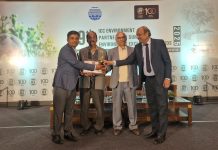The Supreme Court on Friday enabled licensed producers to produce green crackers on the condition that their sale is not brought in Delhi-NCR without approval.
A bench headed by Chief Justice B R Gavai likewise asked the Centre to take a fresh appearance at the outright restriction on the manufacture of firecrackers in Delhi-National Capital Region (NCR).
The bench, likewise making up Justices K Vinod Chandran and N V Anjaria, directed the Ministry of Environment, Forests and Climate Change (MoEFCC) to speak with all stakeholders, consisting of the Delhi Government, producers, and sellers, before coming to a decision.
“In the meantime, we allow the producers who are having the accreditation of green crackers as licensed by NEERI (National Environmental Engineering Research Institute) along with PESO (Petroleum and Explosives Safety Organisation) to produce. This will be subject to an endeavor by the makers to this court that till more orders passed by this court, they would not offer any of their crackers in the restricted locations,” it ordered.
Centre told to review blanket ban with stakeholders
The conditional order permitting certified manufacturers to produce green crackers till the plea is heard again on October 8 on filing of the MoEFCC report on the issue assumes significance as earlier on April 3, a bench headed by former top court judge Justice A S Oka, refused to relax the ban on the manufacture, storage and sale on firecrackers in Delhi-NCR.
Justice Oka had noted that air pollution levels remained alarming for a considerable time and a large section of the population worked on streets and was the worst affected by pollution.
Court seeks balance between pollution control and livelihoods
On Friday, the CJI-led bench batted for a balanced approach keeping in mind the right to livelihood of workers employed in such manufacturing units and the fact that such a complete ban is hardly implemented fully.
The orders were passed while hearing the 1985 PIL of MC Mehta relating to environmental concerns in Delhi-NCR.
The bench said while curbing pollution was essential, an absolute ban was not “practical or ideal”.
The court illustrated it with the prohibition on mining in Bihar, which inadvertently gave rise to powerful illegal mining mafias.
“It will be appropriate that the Union of India comes forward with a solution after taking all the stakeholders, including the Delhi Government, the manufacturers and sellers of crackers, on board. As has been experienced, that despite there being a complete ban, the ban could not be implemented,” the bench stated.
The order went on, “As was seen by us in among the judgments where in the State of Bihar, a total restriction on mining, had actually resulted in unlawful mafias participating in business of mining. Because view of the matter, it is required that a well balanced technique needs to be embraced.”
Senior advocate Balbir Singh and K Parmeswar, appearing for some manufacturing units, argued that the April 3 order, which extended the firecracker ban in NCR throughout the year instead of just during the winter pollution season, was in conflict with its 2018 judgment in the Arjun Gopal case.
The bench declined to examine the issue at this stage.
Parmeswar, however, urged the bench to permit manufacturing under strict monitoring, suggesting that companies could declare quantities publicly and make detailed disclosures to ensure compliance.
Senior advocate Aparajita Singh, who is amicus curiae, opposed the manufacture of crackers in NCR, cautioning it would inevitably lead to sales and illegal use within prohibited areas “What is the problem in allowing them to manufacture if they follow norms? There has to be a solution. Extreme orders will create problems. So let them manufacture and let there be no sale in NCR till further orders,” the CJI said.
The bench said the ban was “hardly being followed on the ground”
The bench directed Additional Solicitor General Aishwarya Bhati, standing for the Centre, to interact its order to the MoEFCC and make sure that assessments with stakeholders are held before the next hearing.
The CJI stated while the battle versus poisonous air contamination stays vital, income issues of employees and useful enforcement difficulties need to likewise direct the last policy.
Released on September 26, 2025




